Brighton & Hove
As a not for profit organisation that has been working since 2008 at a citywide level on initiatives that use community food growing to improve the health and wellbeing of residents, regenerate areas experiencing anti-social behaviour and improve bio-diversity we are able to offer expertise to other places wishing to do the same . All of this work sits as part of our City Food Strategy, which BHFP wrote so we are also able to offer support / advice about food governance at a city level. We are also happy to work with other initiatives to pilot ideas emerging from the programme.
Brighotn & Hove is a compact city on the south coast of England with a population of 230,00. The Brighton & Hove Food Partnership (BHFP) is a hub for information, inspiration and connection around food. We help people learn to cook, grow food, eat a healthy diet and waste less. We prioritise work with people experiencing deprivation, isolation, poor health and other life challenges. Independent evaluation shows that our work makes lasting changes to habits and behaviours which improve lives. We all eat, and food is central to life’s celebrations and memories – food activities can engage a wide range of people. Our approach uses this power of food to bring about change.
Official Website
Fundació Solidaritat
The UB Solidarity Foundation (FSUB) has a large experience in promoting the social and labor integration of people at risk of social exclusion in the Metropolitan Area of Barcelona through social agriculture. FSUB has implemented several social farming projects and has focus its work on the educational, recreational, personal well-being and social functions of the urban gardens.
FSUB also promotes other types of NBS for sustainable development and social resilience in several countries (Senegal, Mauritania and Vietnam). FSUB through its water and environment program aims to contribute to the sustainable water management promotion and has an active role in boosting and implementing nature based technologies (e.g. Constructed wetlands) at international level.
Some of our best practices are Social gardens in the Metropolitan Area of Barcelona in Sant Feliu de Llobregat, providing an occupation to unemployed people in 70 gardens and 3 Plots of 2.300 m2 in Santa Coloma de Gramenet also with unemployed, pensioners and vulnerable groups. In addition, we’ve been taking part in the technical course on urban gardens maintenance, composting and gardening) with ASSÍS Verd Foundation for homeless people, as well as the constructed wetland pilot plant in the Campus of the University Gaston Berger of Saint Louis (Senegal) for wastewater treatment and reuse in agriculture.
FSUB provides technical advice to the Follower City of City of Sant Feliu de Llobregat (SFLL) for the planning and implementation of ECS in the municipality. FSUB will facilitate the commitment and citizen involvement in the project and the dynamization of local actors, including the most vulnerable social groups.
Official Website
Transition Oststeiermark (TO)
Transition Oststeiermark (TO) is a not-for-profit grassroots NGO that operates in and around Gleisdorf in south-eastern Austria. It was created in 2012 and registered as an association on 30-01-2013. We believe that an environmentally friendly way of life is characterized by improved quality of life, an expanding number of social contacts, and increasing meaningfulness. By engaging citizens in active projects we can stimulate community awareness and create a world that lives in harmony – with nature, and with our fellow human beings, and improves the quality of life for generations to come.
TO is part of the global Transition Towns Network, a movement of communities coming together to reimagine and rebuild our world and achieve a resilient society free of fossil fuels in a planned and smooth way. The idea is to make concrete small steps together in groups to ease the transition.TO consists of people working together in different groups, supporting a repair initiative, planning the erection of PV systems on individual and public houses, and closing resource loops, not least by making settlements edible.
Official Website
SEMIDE
UT SEMIDE is an institutional network of Ministries in charge of inland water of the Euro-Mediterranean Partnership countries. It has a core activity on data management for integrated water resources planning. It aims at collecting and facilitating the sharing of information and experiences in the water sector.
UT SEMIDE is part of the Management Committee the Cost Action Circular City and developing the exploitation plan, including business plans for circular economy solutions based on Nature Based Solutions for providing water to local food production.
UT SEMIDE will contribute to monitoring activities on water, environment issues and links with EU policies as well as on business development and market uptake. It will also use its wide network in the Mediterranean for transfer and dissemination as well as to support market uptake.
Some of the best practices of SEMIDE are the development of “Business models for regenerative and nature-based water solutions” in the framework of HYDROUSA project, and the implementation of Sustainable Mediterranean Cities platform to promote the exchange of good practices on water and waste management.
Official Website
Association la Recherche en Action (REACT)
REACT is a sustainable development association with an expertise in the fields of Water management and the integration of non-conventional water (rainwater, wastewater) for optimal use of water resources in arid environment and to achieve zero discharge. The treatment of non-conventional water by nature-based systems (CW) to be in accordance with planned use, health requirements and the reuse of the related nutriments.
Protection of biodiversity while developing and integrating endemic plants into both ecological and production systems. Governance and institutional aspects related to water and health and support to decision-makers and main actors. Moderation, dissemination and awareness-raising among different target groups including young people.
Some of our best practice examples are:
- Contribution for the identification of suitable plants for an installed community garden (Project JaCoTuCo Tunis/Cologne).
- Creation of micro-reserve for the conservation of Jerba’s heritage species (CEPF project, Jerba).
- Elaboration of a charter for the conservation of a strict endemic species / development of Garrat Sajnane (CEPF Project, Save Plants).
- Assistance to decision-makers concerning water governance / water code and national health policy (water governance project and social health dialogue).
- Awareness and training of young people in the creation of terrariums.
- Raising awareness among young people on water management by developing interesting collective games with the collaboration of the City of Science of Tunis (Water Governance Project).
- Awareness-raising among decision-makers and the local population on the conservation value of Garaat Sejnene plants (IUCN-Med project).
Our main role in the project is to support the Follower City Carthage with the integration of ECS into urban master plans and the ECS development adapted to specific climatic, social and cultural contexts. This implies the integration of sustainable components on ECS linked to water and biodiversity, co-creation and exchange meetings with main actors as well as the implementation of the Carthage city team, including the awareness-rising, capacity building, dissemination and the sustainability of EdiCitNet achievements.
Official Website
Bundesverband GebäudeGrün e.V. (BuGG)
The Bundesverband GebäudeGrün e.V. (BuGG) is the well-established center of knowhow and information of on Green Roof, Façade Greening and Interior Greening topics and technology in Germany.
More than 340 members belong to the BuGG. These include manufacturers, suppliers and distributors active in roof, façade and interior greening, as well as architects and landscape architects, cities and municipalities, universities and institutes, as well as private individuals and students.
Roofs and façades are very important parts of the building. Therefore, we place particular importance on high-quality greening systems, professional application and maintenance and compliance with standards.
Bundesverband GebäudeGrün e.V. (BuGG) is one of the NGOs of EdiCitNet and the expert for building greening. This includes technical and practical knowledge of all aspects which are connected with Green Roofs and Green Façades. In EdiCitNet BuGG will share its knowledge and guide the other participants in installing Green Roofs and Green Façades for urban farming.
Official Website
mundraub.org
mundraub.org is an online platform for all who want to discover local fruits, nuts and herbs in public spaces and help shape the edible landscape worldwide.
More than 70.000 users share POIs, set up planting and harvesting events and share information on everything fruit-related in local groups.
By developing mundraub regions and/or edible districts, mundraub combined the digital aspect with real-life experiences – bicycle tours, harvesting & planting events. This involves preparation, organisation, execution and follow-up activities.
As a social enterprise with an array of business models, mundraub supports the project with its expertise in the field of business model developing and market uptake.
A central part of mundraub is the mundraub map, a mapping tool already serving as an Edible City Solution itself. Our almost ten year knowledge in collecting and visualizing data will aid in creating and visualizing the Edible City Network.
Official Website
Prinzessinnengarten /Nomadisch Grün gGmbH
Prinzessinnengarten is a social-ecological urban agriculture in Berlin. Our goal is to set low-threshold opportunities for environmental education and participation, to develop urban gardens as places for community learning about biodiversity, climate adaption an sustainable living in urban spaces. Therefore we transform urban spaces into publicly accessible green spaces such as community gardens for the neighborhood, environmental education spaces for local institutions and urban vegetable fields for the ecological production of vegetables. Our team hosts regular community gardening sessions to enable public citizens to participate in the cultivation of plants, learn about the principles of regenerative agriculture and the value of good food.
Address:
Hermannstr. 99-105
12051 Berlin
WaterLove
The nonprofit organisation Waterlove gUG was founded in Andernach in 2018 with the goal to save our seas and especially their inhabitants.
Our central feature is to inspire rethinking how to treat nature with care. We stand for nature protection, sustainable environmental protection and above all for protection of water.
Waterlove successfully organizes a lot of clean ups anywhere in Germany. We have a good cooperative partnership with many organizations, associations, companies, schools and kindergartens.
We really enjoy visiting different fairs to inform people about how to prevent waste and we therefore show them several opportunities to replace plastic.
Waterlove has a huge field of action with a lot of projects. One of them is a corporation with a local garage, where you can bring your old tires to. This way we can avoid, that tires are disposed in the woods or in our rivers.
More projects to name are: collection of cigarette butts which are reused again as portable ashtrays; planting trees together with a local supermarket; offering different workshops for example for self-made toothpaste.
Everyone is invited to support Waterlove, come and join us!
Official Website
Address:
Hochstraße 85-87
56626 Andernach
Germany
GRÜNE LIGA Berlin
GRÜNE LIGA Berlin is an NGO comprehensively supporting environmental protection and sustainable social development. GRÜNE LIGA Berlin’s specialization and focus are directed at environmental education and counseling, education promoting sustainability and supporting urban gardening.
The Berlin Landesverband (state association) is a member of GRÜNE LIGA Germany, a network for eco-friendly movements and an environmental association active on a national level, which is historically rooted in the environmental and peace movements of the GDR. The network’s objective is to provide support as well as specialized coordination for independent environmental groups and initiatives.
Actually GRÜNE LIGA Berlin conducts the project “Integrierte urbane Gärten – Schul- und Nachbarschaftsgärten in Marzahn-Hellersdorf” in the district of Marzahn-Hellersdorf. The project is supporting school and community gardens by building up garden infrastructure for the various projects as well as conducting regularly workshops for for the urban gardeners.
Official Website
Address:
Prenzlauer Allee 8
10405 Berlin-Prenzlauer Berg
Germany
Tarpuna
Tarpuna is a non-profit social initiative cooperative formed by a team of people committed to sustainability, equality of opportunities and social justice.
We do social innovation at the service of the community, through transformative local projects with sustainability criteria. We essentially work on three basic areas of everyday life: agriculture (and food), energy, and manufacturing (the objects).
We are passionate about cooperative projects, and what motivates us is not only ‘what’, but ‘how’ and ‘why’. We organise ourselves with self-managing work, with a continuous communication among us and with all the network we build on.
Tarpuna means “to sow” in Quechua. We took this word to call ourselves because we like to give birth to transformative initiatives that have their own lives. To do this, we work transversely with people from different fields.
Social growing gardens in Sant Feliu de Llobregat, is one of our agricultural projects, with which we aim to help people with social, education or economic problems to empower themselves and to develop useful skills to live better. Sant Feliu de Llobregat is one of the cities, among others, that has bet on growing gardens as a very complete strategy to improve the quality of life of the citizenship.
Official Website
Slow Food e.V.
Slow Food promotes a sustainable global food system and culture based on responsibility and respect towards the environment, the farmers and animals involved in this system as well as on the importance of enjoying good and tasty food. The basic prerequisite for this approach is to preserve the bio-cultural and taste diversity and to acknowledge the value of food as a “means to life”.
We are committed to upholding small-scale agriculture and artisanal fishing practices as well as food production chains that are in harmony with our ecosystems, animal welfare, the revival of rural areas, and our cultural traditions. To achieve this goal, Slow Food provides nutritional and taste education for children, youths and adults, as well as training programs for young professionals in gastronomy, agriculture, and the food sector. We connect artisanal food producers with conscious consumers, the so-called co-producers.
Slow Food Deutschland e. V. (Germany) was founded in 1992 – as the first national association outside Italy. At the beginning of 2019, it counted over 14,000 members in 85 local groups. The office of the national organization is located in Berlin.
Role of Slow Food Deutschland within EdiCitNet project:
Current environmental and climatic challenges make it crucial to work on a more sustainable food system on all levels and in all areas. It is more necessary than ever to find sustainable and local ways of growing and sourcing food in the growing urban centers, which is why Slow Food supports the initiative of edible cities. One of our local groups collaborates on one of these projects in the city of Andernach. Slow Food Deutschland would like to use this and other contexts, such as our educational work and our formats for raising awareness for more sustainable production and consumption patterns, to jointly make the idea of edible cities more known. Within the framework of edible cities, we would like to connect actors working in the field from different networks.
Further points of action are:
- Slow Food educational programs for children and teenagers about food, soil, the climate and the global aspects of food production. Our current projects such as the Slow Food Youth Akademie and Edible Connections are listed here: https://www.slowfood.de/was-wir-tun/bildung. These projects also come with learning aids to be distributed. Our communication channels are used to amplify the importance of these important topics.
- In Andernach: Slow Food Garden in Andernach – raised flowerbeds with permaculture
- The International Ark of Taste project and other Slow Food projects dedicated to safeguarding biodiversity: https://www.fondazioneslowfood.com/en/what-we-do/the-ark-of-taste/.
Official Website
Spreeacker
Spreeacker was called into life in 2011 by the Spreefeld Cooperative, as a collection of gardening, education and cultural initiatives. The goal was inviting the neighborhood and the larger community to discover, explore and activate the open spaces next to the River Spree, surrounding the construction site that would become the Spreefeld Neighborhood. The Spreeacker non-profit association emerged out of this, and has gone on to develop and manage a number of community gardens at this location. This garden work is meant to be enjoyed as well as to be educational, for all involved and the wider public. ; The first plots with native fruit trees have long since been planted. A model project for edible landscapes – a Food Forest – has been initiated in public space: in cooperation with the Spreefeld Cooperative and the District of Berlin-Mitte. The Food Forest brings together practices of permaculture and edible landscaping with nature’s way of developing forests. More than 80 different plants in this garden are edible and/or productive: everything from the leaves of small herbs or fruits and nuts produced by trees and bushes. This Urban Food Forest is growing with the support of the surrounding community. Spreeacker aspires to a wide range of external collaborations and partnerships with experts, students, neighbors, activists and interested persons.
Spreeacker is committed to developing and demonstrating the practice of edible and productive landscapes in urban, public spaces. Spreeacker understands itself as part of a larger movement actively working to stay ahead of the emerging food and climate crises.
The practice of developing and demonstrating edible and productive landscapes in urban, public spaces, in cooperation with private and public partners, neighbors, experts, students and activists. ; Educational work regarding tours, visits, workshops and discussions with a wide range of groups. Currently working on a new project, KollektivesLernen, with Marco Clausen. ; https://www.kollektiveslernen.net/; Contacts with permaculture experts, community garden activists and other food experts.
Some of their achievements are the development and start of the Food Forest, Waldgarten, in the Wilhelmine Gemberg Weg; managing community gardens with refugees and immigrants and bringing food growing into the public spaces of our neighborhood, including raised beds into the street space.
A crucial turning point for them was signing the use-agreement with the local government to be able to develop the Food Forest on land owned by the government. In the future we expect to be producing a good amount of food, especially fruits and berries and nuts.; for now, our main service is educational.
Official Website
Address:
Wilhelmine Gemberg Weg 12
10179 Berlin
Germany
BAUFACHFRAU Berlin e.V.
BAUFACHFRAU Berlin e.V. is an association working in the field of Education for Sustainable Development. We qualify in themes like Green City, Sustainable Building and Zero Waste strategies. Our work includes the theme of edible cities as well in our participation projects with neighbourhoods, where we built and work with different people.
In our work in the context of sustainability we include and promote the theme of Edible Cities, because we estimate it as important as well as integral relevant for changing cities to liveable places for their inhabitants.
We promote ECS in our work theoretically as well as implement realization of small activities towards ECS in Berlin in our practical participation projects.
Some of the networks we have been involved with are the RENN network, which links stakeholders from all areas of society to make sustainable development everyday practice at regional level (https://www.renn-netzwerk.de/en/) and the Deutsche UNESCO Kommission / Education for Sustainable Development (http://preview2018.unesco.de/bildung/bne-akteure).
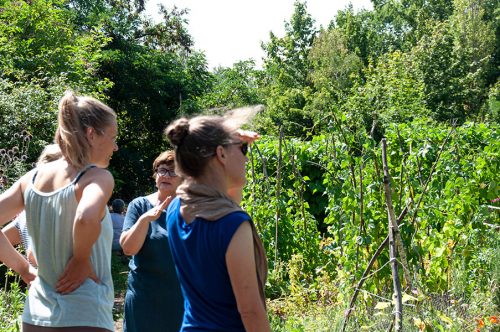
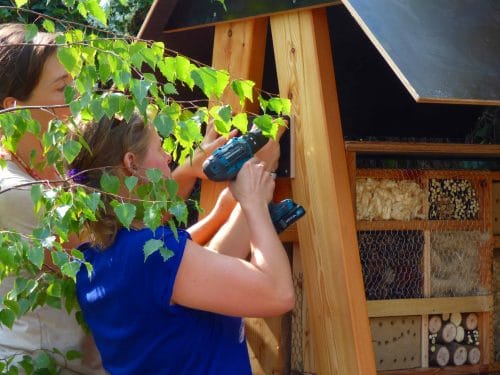
Our main service includes Promotion of ECS-Goals by work-based-learning-qualifications in the theme of “Green Cities” as well as participation projects in the neighbourhood within the themes of urban gardening and ECS.
Official Website
post [at] baufachfrau-berlin [dot] de
Address:
Lehderstr. 108
13086 Berlin
Germany
The Open Food Network (OFN)
Providing short food supply chain systems to build resilient local food economies.
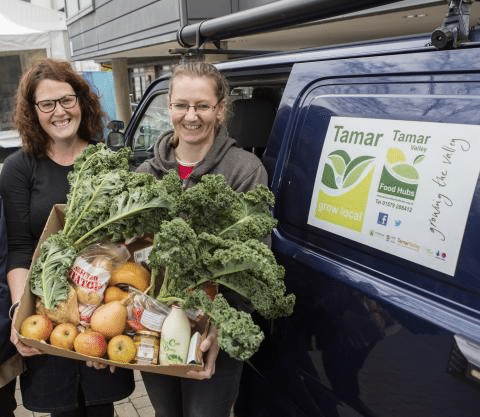
Our open source platform enables new, ethical supply chains. Food producers can sell online, wholesalers can manage buying groups and supply produce through networks of food hubs and shops. Communities can bring together producers to create a virtual farmers’ market, building a resilient local food economy.
The Open Food Network software platform allows farmers to sell produce online, at a price that works for them. It can be embedded in your own website, or hosted on ours. It has been built specifically for selling food so it can handle tricky measures or stock levels that only food has – a dozen eggs, a bunch of parsley, and a whole chicken that varies in weight, anyone?
It’s a great shopfront to sell food through as an individual enterprise, but where it really gets exciting is when there’s a community of farmers working together.
Official Website
hello [at] openfoodnetwork [dot] org
Address:
44 Bisley Road,
Stroud GL5 1HF,
United Kingdom
Stadtgärten e.V.
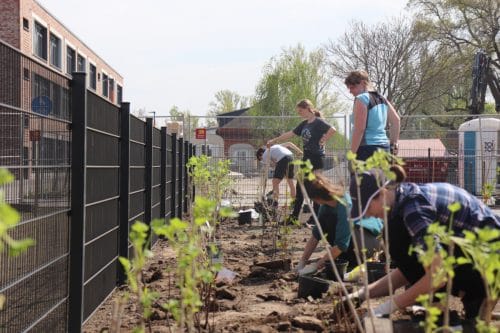
We are engaged in urban gardening, promoting old and seldom species. We see food production as a key element for co-creative infrastructure development while providing a positive risk-benefit ratio for volunteers and a diverse set of stakeholders. We love to learn about roof-top/ vertical-farming, automation, the deployment of irrigation systems or sensor networks. Currently we focus on the City of Dresden in Germany.
We have been doing urban gardening for more than five years. Our strength is uniting diverse perspectives, stakeholders, and engagement areas, such as the inclusion of refugees or cultural education, with profound knowledge on Engineering and ecology. In our perception urban gardening provides opportunities to develop social innovations, that go beyond incremental changes in existing structures and systems. We connect education for sustainable development with environmental ethics, daily practices and our beneficiaries lifeworld. Researching is part of our soul.
We are involved in edible city projects and develop edible city solutions on our own. For instance researching in potential synergies and diverse organisational patterns, the use of rare species and wild herbs in adaptation to climate change, among others. We are participating in other networks like Dresdner Gartennetzwerk, Anstiftung, FÖJ and Innovationsplattform Zukunftsstadt.
Official Website
zukunft [at] stadtgaerten [dot] org
Address:
Risaer Straße 32
01127, Dresden
Germany
RESTLOS GLÜCKLICH e. V.
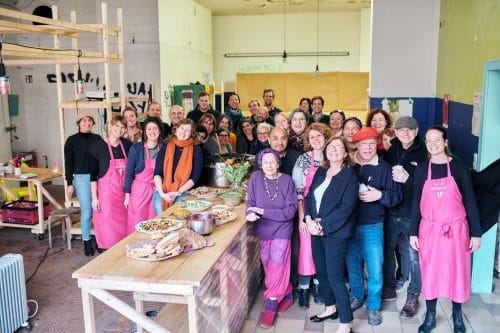
Our non-profit organization RESTLOS GLÜCKLICH is campaigning for more appreciation of food’s value and sustainable food consumption.
We educate people about climate-friendly nutrition through community projects, interactive activities and individualized workshops. We empower people of all ages to raise awareness about conscientious ways of
cooking and handling food.
Small and simple changes in our kitchen already have a big impact on our health and climate. Look forward to creative cooking workshops and table talks with sustainable ideas on how you can cook healthy and delicious food in your everyday life without much effort.
Official Website
hallo [at] restlos-gluecklich [dot] berlin
Address:
Wilhelm-Kabus-Straße 24
10829, Berlin
Germany



















